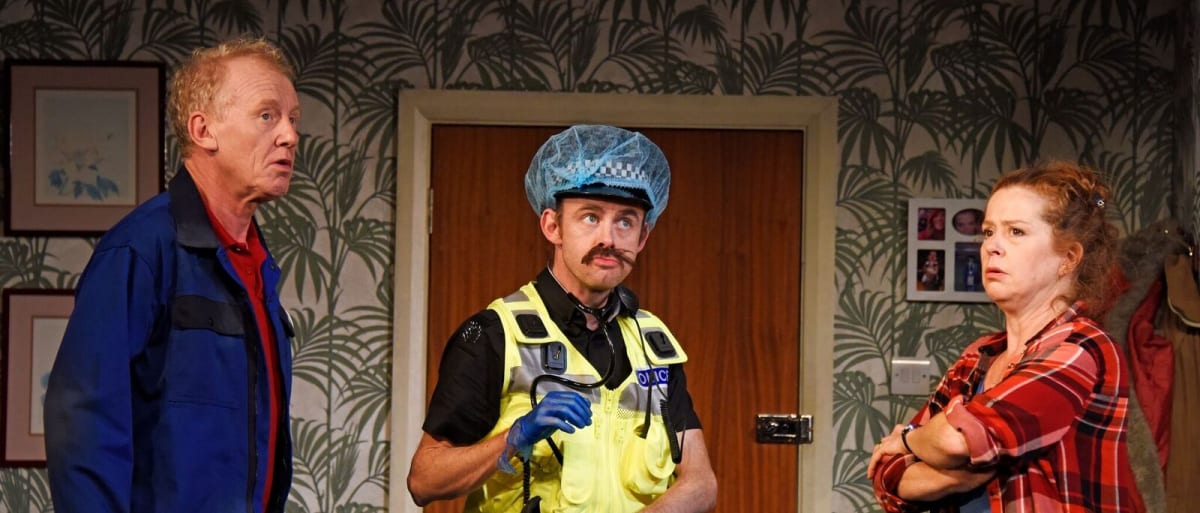Written by the late Italian actor, author and Nobel Prize Winner Dario Fo, ‘They Don’t Pay? We Won’t Pay!’ is seen as a political satire based on its sardonic outlook on political hypocrisy. The play consists of two working-class women who resort to stealing from the supermarket due to drastically rising food prices. To hide the stolen groceries from her socialist and by-the-book husband Jack, Anthea’s creative lies cause a chain reaction of embarrassing, farcical situations. Fo’s play has the quality of an easy-watching television sit-com with left-wing political ideals at its core.
With the permission from the producers (Northern Broadsides and York Theatre Royal), I attended the first showing of the play before press night – and with such a heavily visual play, it was impressive how smooth the performance ran.
Deborah McAndrew’s adaptation of the play lets the Northern Broadsides cast shine through and the energy of the five actors is the reason to see this play. As the audience are still shuffling into their seats, all five actors get comfortable upstage and play singalongs to the crowd with guitars, a drum box and a harmonica. This light-hearted introduction of the actors rather than the characters is both brilliant and original, illustrating the wholesome nature of the cast. As all the characters slowly leave the stage, Michael Hugo remains playing the harmonica as the play slowly starts, blurring the point in which the play actually ‘begins’.
The tongue-in-cheek comedy has the audience laughing throughout the course of the play. Assuming the audience’s understanding of current affairs, the characters use local references for comic effect and has the York audience roaring with laughter through relatable jokes. One of the main sources of humour is found in their purposeful corpsing and fourth-wall breaks. This is done perfectly and entertains throughout as it doesn’t compensate for the plot. Whether it is Lisa Howard’s puns towards the audience, the production crew helping with broken props or Michael Hugo coming out of character to argue about playing so many different roles, the variety keeps the comedy fresh and funny.
The balance between political and slapstick humour weaves throughout the play, taking it in turns to make the audience laugh. However, the political seriousness of the play often seems overshadowed by the light-heartedness of the performance. Indeed, as McAndrew says in an interview, Dario Fo “finds the ludicrous in the most tragic things, and in the most difficult things” but sometimes in this play the tragic political statements are actually found within the ludicrous, causing a slight unbalance and dominance towards the latter. In the first half of the play, the political aspect is brought to the surface mainly through long monologues concerning industry or corporate hypocrisy in a way which says “look, this is a political farce”. However, the political lens of the play improves after the interval and weaves through the comedy in more unison.
The serious theme of the Jarrow Marchers at the end of the play is slightly out of the blue too and could be referenced more to make the theme run a little smoother. The Jarrow March occurred in 1936 as hundreds of men from the North-East town of Jarrow marched to London with a petition to re-establish their local industry. Therefore, it is a clever inclusion as it involves similar connotations to the play, yet it’s significance in the play seems to escalate from nowhere and leaves the ending slightly flat.
The plays use of comedy as a way of illuminating corporate or political injustice and the realities of low income societies is fantastic, albeit not always mixing together perfectly. The five cast members seem to put their all into the show and come across as a down-to-earth, talented group of friends enjoying themselves, a quality that instantly rubs off on the audience in a very positive way.

